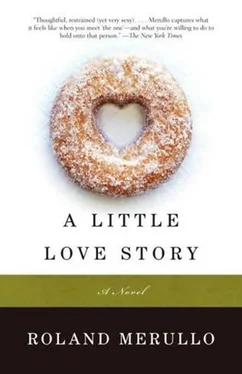Janet had a particular way of pursing her lips when she was bothered by something I did or said. It made small ridges of skin at the outside edges of her mouth, and made the freckle almost disappear. When she pursed her lips like that in my direction, I knew everything was more or less alright between us. Ellory looked from me to her and she said, “No, he’s… flawed. I thought he might be someone special when I first went to work for him. He’s charismatic, in a politician’s way. He seems to care about children, really, and he’s good with his own daughters. When I first saw him-I went to work for him during his first campaign when I was right out of grad school-I thought he might turn into a great governor someday. I thought he might even run for president-he still wants to. But I’ve been there almost four years now and he’s squeezed three-quarters of the idealism out of me.” She coughed her deep wet cough and I watched my brother watching her. “I wanted to do something good for the world. Now I want to keep my health insurance and have someplace to go on rainy weekday mornings in February.”
“I was more idealistic at first, too,” Ellory said when she was finished. “The routine here breaks it out of you. That’s good, I think, or natural. Every life does that. Marriage does it, work does it. The trick is to somehow keep the gates open in the fences at the edge of your mind and not get hard and bitter. You don’t strike me as hard and bitter. Jake doesn’t strike me that way either, in spite of everything that’s happened to him.”
Janet looked at me when Ellory said that. It was as if I’d just taken off a pair of dark glasses and she was seeing my eyes for the first time. She looked back at Ellory, who was taking the opportunity to gulp down the second half of his sandwich, and whose eyes slipped once to the cigarettes on the desk.
“Don’t you miss sex?” she asked abruptly. “Don’t you miss being close to someone that way?”
“Sure.” Ellory got up to put his dish in the sink, and toss the waxed paper in the wastebasket. He washed the oil from his fingers, dried his hands, and looked at the cigarettes again, then came back and sat in his chair. “When I first started living here I used to masturbate every Monday night, right on schedule, once a week. It was something to look forward to.”
It did not sound like he was talking about sex. All the dirtiness and sweet spark had been taken out of it.
“I miss women,” he went on. “I miss that kind of intimacy. But I think whatever people do, they do in search of pleasure. Or trying to get rid of pain or fear, which is the same thing, basically. Everything, everything is really about that. Everything is about bringing your mind to a place where it’s at peace. There are just different routes. Some of them seem to lead there, and lead there for a while, and then don’t. Some things work for one person and don’t work at all for another person. Our sister takes a lot of drugs. Jake told you that, I’m sure. She just wants to put her mind in a pleasurable place or she just wants to get rid of the pain that’s there. It’s not a sin. It’s not something God despises her for. It doesn’t work, that’s all. And it just leads to her doing things, to herself and other people, that drive her farther away from the peace she’s looking for. That’s hell.”
Janet was staring at him. I was looking at the bookcase on the wall, measuring everything Ellory said against the photograph there.
“Bro,” I said, when he stopped for a breath.
“What?”
“You’re, you know, preaching a little.”
Janet said, “No he isn’t, Jake.” Then, to Ellory, “And this works for you, living like this?”
“It’s a good setup for someone like me, it wasn’t always.”
“Jake said you were wild.”
“I was afraid of dying, that’s all.”
“And now you’re not.”
“I might be, when the time comes. I imagine I will be, but maybe less than I would have been if I hadn’t come here. I’m curious about it some days.”
“Me, too,” Janet said.
I got up off the bed a little too suddenly, stepped out through the front door, and closed it most of the way. I went just far enough to be out of the window light, partway around the corner of Ellory’s little house. I looked across the dark fields. By then the moon was well up in the sky and the night was clear and we were far out in the countryside so that, even with the moon, there were about three times as many stars as I was used to seeing. You could feel the first bite of winter in the air. And in the darkness the monastery grounds and the dark shapes of buildings on a little rise half a mile away seemed to be giving off the scent of desolation.
My hand and my rib and one side of my face throbbed every time a pulse of blood went through them. I knew we weren’t going to New York then. I suspected I had never really been planning to take Janet to New York on that trip. Something moved up through me when I admitted that to myself, a twist of old anguish twirling up the bones of my back. Riding along with the anguish, or right behind the anguish, came a beautiful sense of relief, something like what I had felt at Diem Bo on our first date. It was a kind of fearlessness, I understood that then, a way of just standing in the moment of time I was standing in and knowing I could probably survive whatever was going to follow that moment. I understood, too, that, in their own ways, Janet and Ellory had both learned to do that, live in the present like that, gobbling up their fears.
After a time I went back into the cabin and they were looking at me. “Thought I’d pee outside,” I told them, and when Janet pursed her lips again, I said, “The neighborhood has gotten lousy here, I thought I heard somebody stealing the golf clubs out of my truck.” And when she kept her eyes on me and that expression on her mouth, I said, “I just needed a few seconds. All is well.”
But she kept looking.
We stayed another ten minutes. We talked about plans to bring my mother there for the January visiting day, and about the season the Red Sox were having, and a little bit about Janet’s mother, a devout Catholic herself. Over the course of the time we’d been dating, Janet had told me how her mother had taken care of her as a girl and as a young woman, doing her chest PT every night, taking her to doctors, sleeping on a cot beside her hospital bed, cooking special meals. A little overprotective at times, Janet said, but kind and tough and fond of men who worked with their hands. Janet kept saying how much I’d like her and how much she’d like me. I’d seen pictures of the woman. But, though she lived only ten minutes from Boston, I noticed that Janet made no move to actually introduce us.
My brother gets up at 4:15 every morning to pray, and Janet and I were supposedly on our way to New York City, so we said our good-byes, exchanging embraces like explorers getting ready to set off across different oceans. Janet and I stepped out into the night. When we were a few dozen steps from the cabin, I looked back and saw that the light was still on, the door still open, Ellory standing there in his bathrobe, watching us. Just before we crossed the rise, I looked back again and saw that the door was closed and the light still showing in the window and I knew he was praying for us then, asking whatever saints and spirits might be out there to watch over us, help us not to turn bitter and hard, not to be afraid.
I did not feel any of those things as we made our way across the monastery hayfield in the moonlight-not bitter, not afraid. I felt then, for some reason, that life was larger and more complicated than I’d ever thought. You couldn’t always be sure where bad luck ended and good luck began. You had to just endure certain things, and let time pass, and try to keep the gates open at the edges of your mind.
Читать дальше












